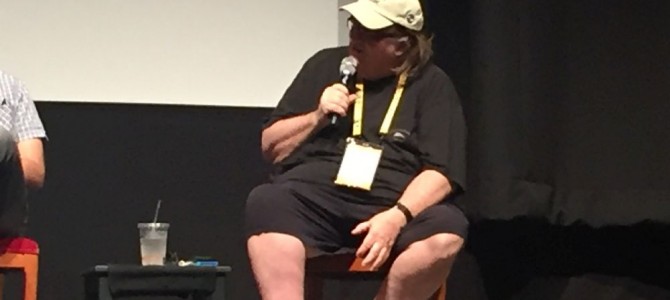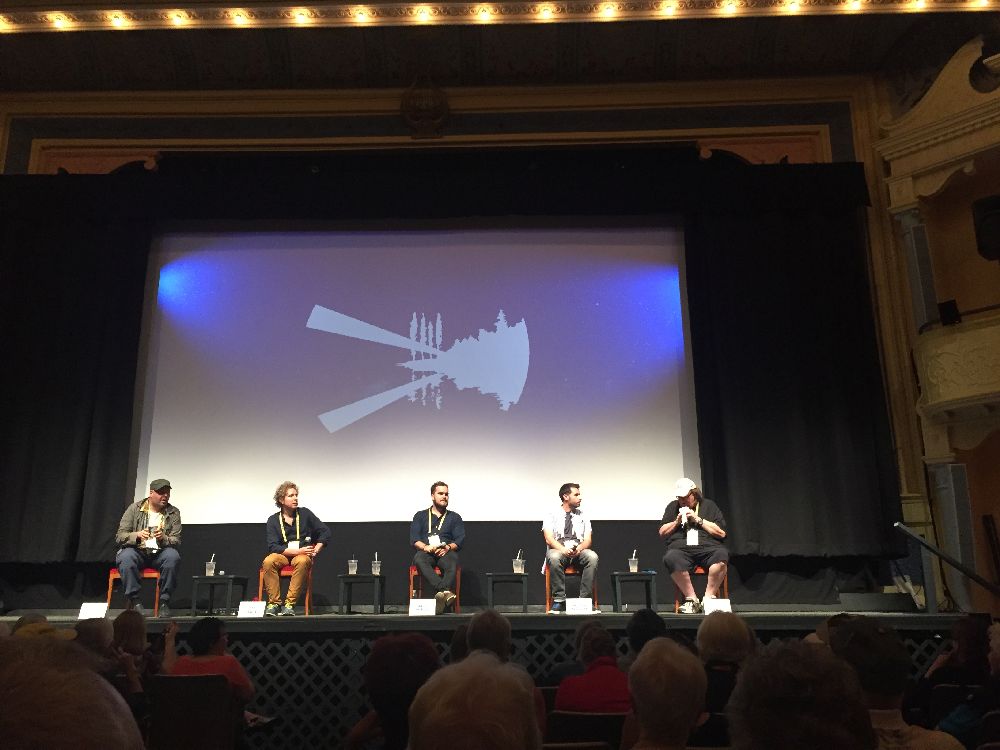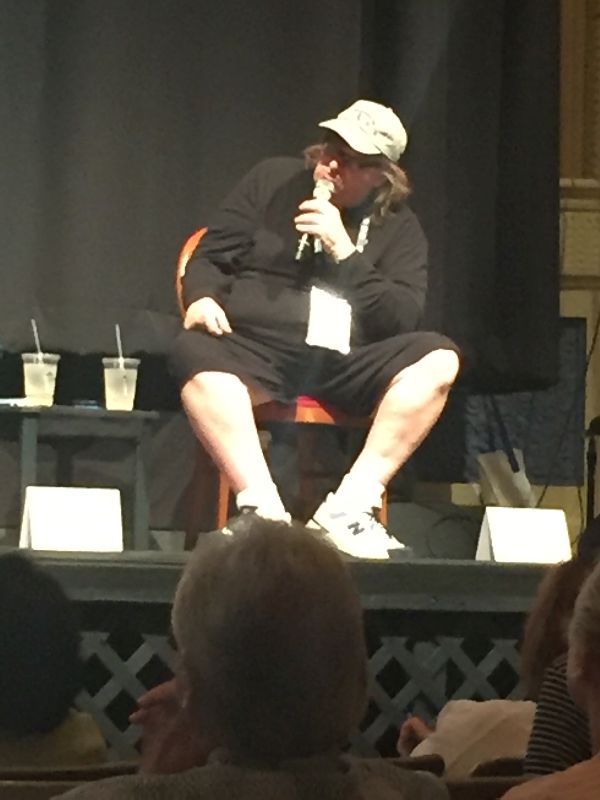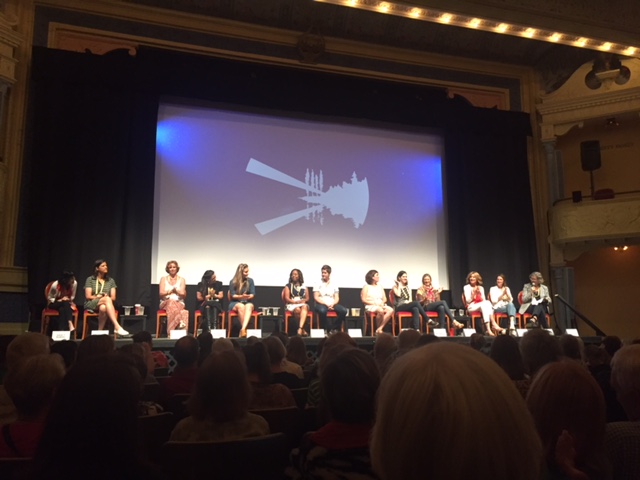
Nestled into a beautiful bay on Lake Michigan is a small town called Traverse City. Every August, Michael Moore and the Traverse City Film Festival (TCFF) take it over. It’s always a surprise that Moore comes back, each year, to Traverse City, a place he says was “hateful,” citing some local opposition to a rainbow-backgrounded bumper sticker on city vehicles, before he came along with his film festival celebration of diversity.

Having grown up not far from Traverse City, I had never noticed how horrible our population really was. My theory that the Traverse City film festival was merely a self-referential, self-congratulatory paean to Moore’s inflated ego, rather than an effort to improve this hateful locale, definitely panned out. The stoic locals seem to tolerate Moore’s condescension because TCFF is a wonderful boost for the economy. I avoided the festivities until this year because I always assumed it would be insufferable.
It is so much worse than I thought. According to Moore, “The Traverse City Film Festival is committed to showing ‘Just Great Movies’ and helping to save one of America’s few indigenous art forms- the cinema. We are committed to showing great movies that both entertain and enlighten the audience.” However, like anything Moore is involved with, discussion of film takes a backseat to liberal politics.
A Film Festival that’s Not About Film
I attended four panels: “Welcome to the Doc Side” (about documentaries), “Men Make Movies: The Struggle Continues (an “ironic” panel highlighting the usual marginalization of women in film festivals), “Who Let the Women In?” (the real panel about women in film), and “Film Under Trump” (billed as a discussion on what might happen to the arts should The Donald become president).

All of the panels had one odd major theme in common, at least for a film festival: they were not, for the most part, about film. Sure, panelists talked about their movies—they had to, lest the audience forget that each panelist, including Moore, was a gift to Traverse City and film-making in general—but they also railed against the horrors of big banks and campaigned to raise the minimum wage to $15 an hour.
Never mind that two key sponsors of the event were wealth management groups tied to big banks, and that the festival largely ran on unpaid labor. But such details seemed unimportant to Moore and his crew or were, at least, inconvenient truths.
My first panel, “Welcome to the Doc Side,” was ostensibly a panel about documentaries. Six of the nine panelists, in keeping with this year’s theme of Women in Film, were women. The moderator was supposed to be Moore himself and, when it was announced he wasn’t coming, there was much gnashing of teeth and rending of garments amongst attendees. Of the nine films represented, only one, “Magnus,” did not have a visible political agenda to advance, and it took only two minutes for someone to invoke the boogie-man that is the American Legislative Exchange Council, which works with corporations that are, clearly, evil.
The panel then quickly devolved into a stump speech for progressive politics, with all nine panelists railing on about the trials of poor Americans and the sad state of the working class. Fortunately, each of the panelists felt, deep in their hearts, that they could relate to economic struggles. One panelist was too poor to afford The New York Times or, more likely, couldn’t be bothered to get it herself (“I just had The New York Times bought for me”), and one was forced to forgo a vacation in the Hamptons for dismal quarters further down the East Coast (“I was on The Vineyard…”).
They had few ideas on how to rectify America’s wage inequality, but agreed the U.S. government could take one major step in spreading awareness of the plight of the poor: fund their documentaries with taxpayer dollars.
Why Can’t a Woman Be More Like A Lesbian
Thursday morning’s panel was “Men Make Movies: The Struggle Continues,” a parody hosted by Moore himself of the women’s film panels that exist at most film festivals. Moore wore sweatpants shorts and a baseball cap. In the panel, we learned little about his theories on filmmaking, but did determine Moore has intriguing theories about genetics (“The Y chromosome is just an X chromosome missing its fourth quadrant”) and that Trump is responsible for poor reviews of the all-female Ghostbusters movie.

When it came to actually discussing how men felt about working with women, it turned out most of the panelists were decidedly—and unexpectedly, given the progressive nature of the festival—anti-feminist. Or, at least, they had a very anti-feminist view of how women are expected to behave in professional settings.
Noah Buschel (who brought his film “The Phenom”), for example, is uncomfortable with women in “flowery dresses” getting things done. “I was just thinking I love working with lesbian producers,” he explained. “If you’re working with someone from the village who’s been in rough dyke bars for ten years, then, you know, there’s not so much women/men stuff. It’s not who’s feminine and who’s masculine, it’s who’s the most competent.”
He went on, unchallenged. “It’s not surprising when you see someone yell at crew that isn’t wearing a nice flowery dress, you know. That isn’t how they’re presenting themselves. It’s not a thing.”
During Q&A, the audience was treated to liberal theory on public school curriculum, when an audience member suggested Moore’s latest offering, “Where to Invade Next,” should be required viewing for all American students. Moore replied that “In France, for a couple of decades, it was part of the national curriculum that every 12 year-old had to watch ‘Roger and Me’ and then they did the same thing with ‘Bowling for Columbine.’”
Clearly, while Moore objects to conservatives “brainwashing” children with public school curriculum, he’s just fine with schools using his documentaries to inculcate students with liberal values. “In many countries they have a national curriculum. They don’t have yahoos out in the sticks determining what can be printed in textbooks,” he said.
Who Cares About Free Speech If It Hurts Hillary
One would hope that the women’s panel, “Who Let the Women In?,” would have some interesting insight to the challenges women face in a male-dominated industry. Unfortunately for the 13 “women in film” selected to speak at the festival, all were crammed on the same panel. Although the women had filmed a music video together, lip-syncing to Aretha Franklin’s “Respect,” none were afforded even minimal consideration. Of the 13 panelists, only a handful were given the chance to speak beyond an introduction.

The final panel was Sunday morning’s “Film Under Trump.” The panel description says it all: “Art, the cinema, is our front line army against fear, hate bigotry, ignorance, and bullies. What role will our film fest and movies in general play in this unbelievable historic moment?”
We will never know the answer to that question, because the panelists didn’t discuss film. At all. For 90 minutes, the eight panelists, including Moore, two women, and an excommunicated Catholic priest, talked only about how much they hated Trump. None of the panelists, including Moore—who is the founder and chairman of the film festival, a 501(c)(3) non-profit—apparently cared about putting that tax status at risk. At the close of the panel, Moore even openly endorsed Hillary Clinton and encouraged audience members not only to vote for her, but to organize, get friends to register to vote, and take time off of work to get five friends to the polls to drown out the Trump voters.
During the Q&A I asked the panel about Hillary blaming a filmmaker for a series of international protests she claimed led to six American deaths in Benghazi and other violence around the world, particularly whether they thought it was fair the filmmaker was forced into hiding and jailed although never accused of a crime.
The panelists seemed stunned I would ask such a question. One wondered why I would be asking a question about something as inconsequential about film. “We’re way too privileged to have to have that conversation,” one panelist replied. “If that’s the conversation we have to have given what the consequences [of this election] are. I don’t mean that as a dismissal, but the real-life consequences of so many people in a Trump presidency that could actually happen…”
When I reminded him this was a film panel at a film festival, so it seemed fair to ask a question about film, the panelists said it was important always to be aware of and fight against any efforts to censor artists, and quickly moved on. My question was the only mention of film.
With that, my trip through the looking glass was over. It would be nice if next year TCFF made their panels a real dialogue, with panelists who have a real diversity of viewpoints, talking about real issues in the film industry, rather than a poor excuse to rant and rave about politics. I’m guessing, though, that there’s about as much chance of that happening as there is of Michael Moore showing up wearing real pants.









